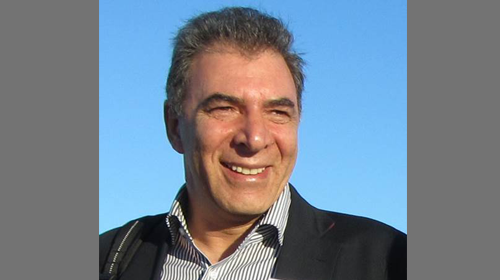You have /5 articles left.
Sign up for a free account or log in.

Kerim Yildiz
American Civil Liberties Union
A British human rights activist has been waiting more than 19 months for a visa to travel to the United States to speak at Harvard University and elsewhere. Civil liberties advocates say Kerim Yildiz’s case raises the concern that the delay may be due to his advocacy of Kurdish rights in Iraq and Turkey.
“There’s nothing we can think of that would justify his denial of a visa, or this kind of delay,” said Nusrat Choudhury, a staff lawyer for the American Civil Liberties Union, which joined with the American Association of University Professors and the PEN American Center in sending a letter last week on Yildiz’s behalf to the Secretaries of State and Homeland Security.
“The cause for concern is he was a frequent traveler to the U.S. He never had a problem and only recently since 2011 has been experiencing these types of delays, and he does work on subjects of potential controversy," Choudhury said.
In a related blog post by Choudhury, the ACLU raised the issue of “ideological exclusion,” a term that brings to mind the Bush-era policy of denying visas for Adam Habib and Tariq Ramadan of the Universities of Johannesburg and Oxford, respectively. Both are prominent scholars who for years were barred from the U.S., ostensibly on terrorism-related grounds – Habib for allegedly engaging in unspecified “terrorist activities” (a claim that was absurd to academics who knew him) and Ramadan for donating to a Palestinian relief organization that has provided some support to Hamas (but which was legal in his native country of Switzerland and which was blacklisted by the Bush administration after Ramadan donated to it). Many academics believe Habib and Ramadan were in fact excluded for their political views and their criticism of American foreign policy. Following a protracted legal battle waged by the ACLU, AAUP and other academic groups – and a change in presidential administration – former Secretary of State Hillary Clinton lifted the visa restrictions for Habib and Ramadan in January 2010.
In December of that same year, a former State Department legal adviser, Harold Koh, sent a letter to the ACLU assuring the organization that the Obama administration “does not engage in the practice of ideological exclusion.” Further, Koh’s letter stated that in evaluating whether to recommend waivers for visa applicants who are deemed statutorily inadmissible on terrorism-related grounds, the State Department would consider the seriousness and recentness of the charge and the reason for proposed travel, giving “significant and sympathetic weight to the fact that the primary purpose of the visa applicant's travel will be to assume a university teaching post, to fulfill speaking engagements, to attend academic conferences, or for similar expressive or educational activities.”
“We laud this administration for having this policy,” said Choudhury, of the ACLU. “We’re just very confused as to how it doesn’t appear to be working the way that it should.” Since Dec. 2010, she said that the ACLU has written letters to government officials on behalf of three human rights advocates or journalists -- including Yildiz -- who were unable to obtain visas for apparent ideological reasons. A Colombian journalist, Hollman Morris, and an Afghan women’s rights activist, Malalai Joya, both received visas after the ACLU brought attention to their cases.
The organization has written twice about Yildiz. The first time was in 2011, when he faced a nearly yearlong delay in obtaining a tourist visa. After the ACLU intervened in that instance – and the very day his story appeared in The New York Times -- Yildiz recalled that he received a call from the American embassy saying that his visa was ready to collect.
Yildiz is director of the London-based Democratic Progress Institute. He has written multiple books on the Kurds in Iraq, Iran, Syria and Turkey. In an interview Yildiz said that he had traveled at least once a year to the U.S. since 1990, often making stops at the State Department to brief officials on his research. Yet something seems to have changed: what, he is not sure. On a 2009 trip he said he was pulled off the plane upon arriving in New York, where immigration officials questioned him about his work and his religion (asking him, for example, which mosque he attends). Then in 2011 there was the long delay he faced in obtaining a visa in which the ACLU successfully intervened.
As outlined in the ACLU-AAUP-PEN letter, in March 2012 he made another application for a tourist visa to the U.S. to speak at Harvard, and at meetings of the ACLU and the Gruber and Open Society Foundations. After seven months of waiting, he contacted then-Ambassador Louis Susman at the U.S. Embassy in London on Oct. 17, 2012; that same day he received a response saying his application was “subject to additional administrative processing.” In February of this year he received a call from the embassy asking him to submit a new itinerary as his original travel dates had passed; Yildiz provided the requested information in April.
In May he was told his application was denied under a section of U.S. code that prohibits admission to foreigners on terrorism-related grounds, but that the State Department had authorized a waiver of this ineligibility. (In this way, the ACLU’s Choudhury said, the waiver process seemed to be working largely as Koh had suggested it might for individuals who are coming to the U.S. primarily for scholarly or speaking purposes.) However, though Yildiz resubmitted his passport for visa issuance on June 19, he has not yet received his visa and was informed in July that additional processing was required.
On Friday, after the ACLU sent its letter, Yildiz said he received an email from the American embassy asking him to resubmit his travel schedule and letters of invitation, because his planned dates of travel again had passed. It has been more than 19 months since he first submitted his application.
"We are concerned that the ineligibility determination, and the lengthy delay in issuing Mr. Yildiz a visa despite the grant of a waiver of ineligibility, are attributable to Mr. Yildiz’s legitimate advocacy concerning the rights of Kurds in Iraq and Turkey. Mr. Yildiz’s exclusion from the United States is unfair to him and infringes the constitutional rights of Americans who wish to learn from, and engage in dialogue with, him," the ACLU-AAUP-PEN letter states.
“We see this as a direct violation of my freedom of expression,” said Yildiz.
A spokeswoman for the State Department declined to comment on Yildiz’s case or the ACLU-AAUP-PEN letter, citing a legal provision requiring confidentiality regarding visa applications. The Department of Homeland Security did not respond to an interview request on Friday.






